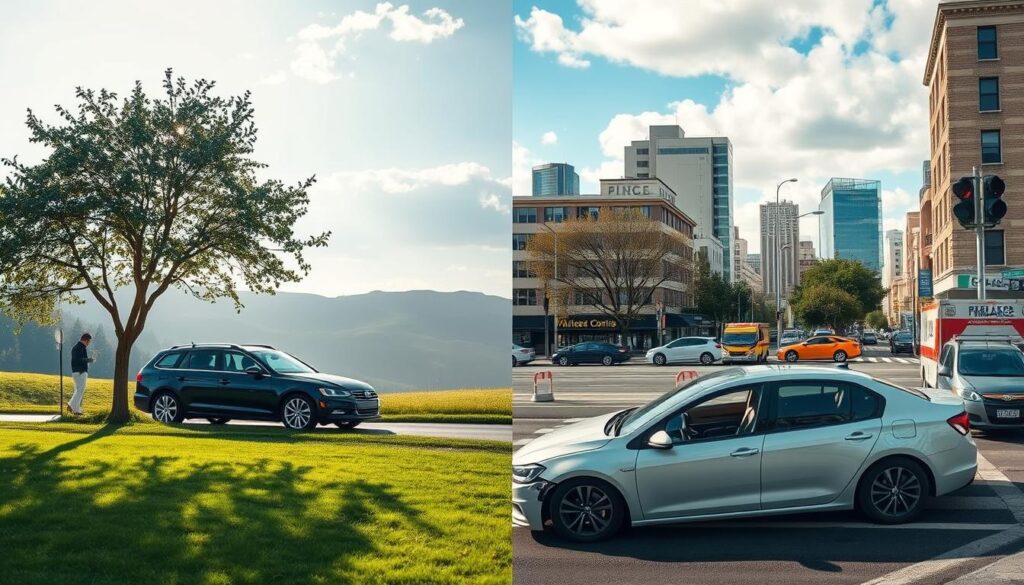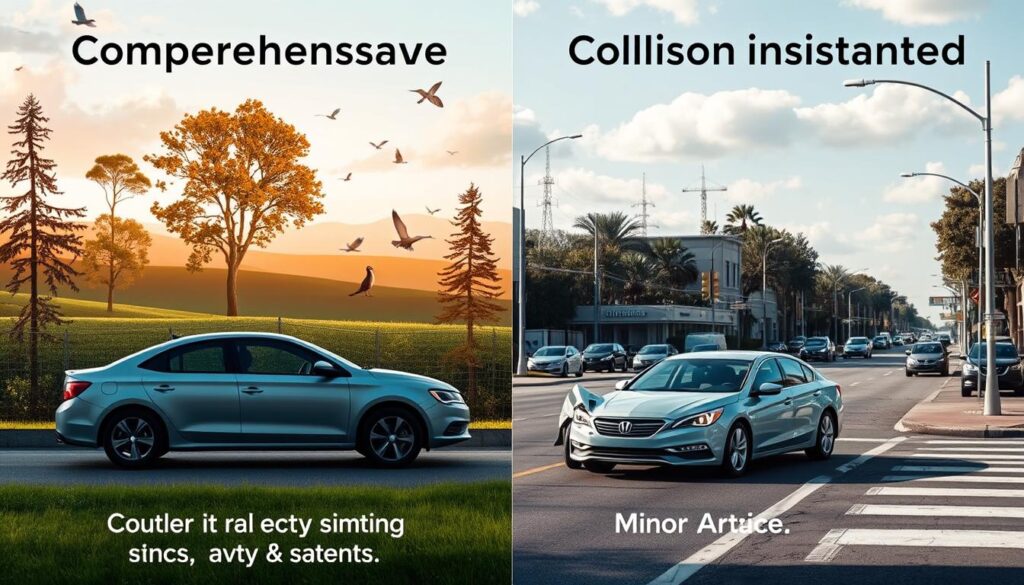Did you know the average American driver files a car insurance claim once every 18 years? With the big investment you’ve made in your vehicle, getting the right coverage is key. Deciding between comprehensive and collision insurance can be tough. But this guide will help you make a smart choice that protects your car well.

Key Takeaways
- Comprehensive and collision insurance offer different protections for your vehicle.
- Knowing your vehicle’s value is important for choosing the right coverage.
- Thinking about your driving history and claim chances affects your insurance choice.
- Picking the right auto insurance coverage gives you peace of mind and financial safety.
Understanding Auto Insurance Coverage
Exploring auto insurance means knowing the difference between comprehensive and collision coverage. These parts of your policy are key to protecting your vehicle.
Comprehensive vs. Collision: What’s the Difference?
Comprehensive coverage protects your car from non-accident damages like theft or natural disasters. Collision coverage, on the other hand, covers accidents with other objects. Understanding these differences helps you choose the right coverage for you.
Evaluating Your Vehicle’s Value
Figuring out your vehicle’s value is essential for choosing the right insurance. The age, make, model, and condition of your car affect its value. Knowing your car’s value ensures your auto insurance coverage meets your needs, whether it’s comprehensive or collision.
Understanding your vehicle’s value helps you pick the right auto insurance. By knowing the difference between comprehensive and collision insurance, you can customize your policy to fit your needs.
How to Choose Between Comprehensive and Collision Insurance
Choosing between comprehensive and collision insurance can be tricky. It’s key to pick the right coverage for your car. When deciding, think about your car’s age, your driving record, and local claim trends.
Start by checking your current auto insurance coverage. Comprehensive insurance covers theft, vandalism, and natural disasters. Collision insurance covers damage from accidents. Knowing your car’s value helps decide which insurance is better for you.
- Look at your car’s value: Consider its age, make, model, and condition. Older or less valuable cars might not need expensive insurance.
- Check your driving history: A clean record can help you save money by choosing lower coverage levels.
- Think about your risk: If your area has a lot of theft or natural disasters, comprehensive insurance might be a good choice.
The choice between comprehensive and collision insurance depends on a cost-benefit analysis and a risk assessment. By carefully considering your options, you can find the right coverage for your car and wallet.

Factors to Consider When Deciding
Choosing between comprehensive and collision insurance involves several important factors. First, think about the deductible amounts and how they affect your costs if you need to file a claim. Look at different deductibles and their premiums to find a balance between coverage and cost.
Deductible Amounts and Cost-Benefit Analysis
Deductible amounts can greatly affect how much you pay for repairs. Consider if you can afford higher deductibles, which might lower your insurance costs. On the other hand, choosing lower deductibles means more protection but higher monthly payments.
Assessing Your Risk Profile
Examine your driving habits and where you live to understand your risk level. If you live in an area with more claims or your car is easily damaged, comprehensive coverage might be best. Make sure you assess your risk well to get the right protection for your vehicle.
FAQ
What’s the difference between comprehensive and collision insurance?
Comprehensive insurance covers your car from non-accident damages like theft or vandalism. Collision insurance, however, pays for damages if your car hits something else.
How do I evaluate the value of my vehicle?
Knowing your car’s value is key to picking the right insurance. Look up your car’s market value based on its make, model, year, and condition. This helps you choose the right coverage for your car.
What are the key factors to consider when deciding between comprehensive and collision insurance?
Think about your car’s age, your driving record, and the local claim frequency. Also, consider the deductible amounts and how they affect your costs. Doing a cost-benefit analysis and understanding your risk can guide your choice.
How do deductible amounts affect my choice of coverage?
Deductibles can change how much you pay out-of-pocket for claims. Look at different deductibles and their premiums to find a balance that fits your budget and coverage needs.
How does my risk profile influence my insurance coverage decision?
Your risk profile, including your driving and where you live, affects your coverage needs. Your driving history and local claim rates can help you decide on the right coverage.

